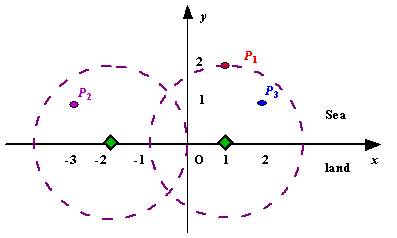poj 1328 Radar Installation【贪心区间选点】
Radar Installation
Time Limit : 2000/1000ms (Java/Other) Memory Limit : 20000/10000K (Java/Other)
Total Submission(s) : 22 Accepted Submission(s) : 9
Problem Description
Assume the coasting is an infinite straight line. Land is in one side of coasting, sea in the other. Each small island is a point locating in the sea side. And any radar installation, locating on the coasting, can only cover d distance, so an island in the sea can be covered by a radius installation, if the distance between them is at most d.
We use Cartesian coordinate system, defining the coasting is the x-axis. The sea side is above x-axis, and the land side below. Given the position of each island in the sea, and given the distance of the coverage of the radar installation, your task is to write a program to find the minimal number of radar installations to cover all the islands. Note that the position of an island is represented by its x-y coordinates.
![]()
Figure A Sample Input of Radar Installations
We use Cartesian coordinate system, defining the coasting is the x-axis. The sea side is above x-axis, and the land side below. Given the position of each island in the sea, and given the distance of the coverage of the radar installation, your task is to write a program to find the minimal number of radar installations to cover all the islands. Note that the position of an island is represented by its x-y coordinates.

Figure A Sample Input of Radar Installations
Input
The input consists of several test cases. The first line of each case contains two integers n (1<=n<=1000) and d, where n is the number of islands in the sea and d is the distance of coverage of the radar installation. This is followed by n lines each containing two integers representing the coordinate of the position of each island. Then a blank line follows to separate the cases.
The input is terminated by a line containing pair of zeros
The input is terminated by a line containing pair of zeros
Output
For each test case output one line consisting of the test case number followed by the minimal number of radar installations needed. "-1" installation means no solution for that case.
Sample Input
3 2
1 2
-3 1
2 1
1 2
0 2
0 0
Sample Output
Case 1: 2
Case 2: 1
题解:先计算出可以覆盖小岛的区间,然后将这些区间按照区间右端从小到大排序,找出是否有重复区间
#include<stdio.h>
#include<string.h>
#include<algorithm>
#include<math.h>
using namespace std;
#define MAX 11000
struct node
{
double beg;
double end;
}s[MAX];
bool cmp(node a,node b)
{
return a.beg<b.end;
}
int main()
{
int i,j;
int island,r;
double a,b;
int k=0;
while(scanf("%d%d",&island,&r)&&island!=0&&r!=0)
{
int ok=0;
for(i=0;i<island;i++)
{
scanf("%lf%lf",&a,&b);
if(fabs(b)>r)
{
ok=1;
break;
}
s[i].beg=a-sqrt(r*r-b*b);//区间左端
s[i].end=a+sqrt(r*r-b*b);//区间右端
}
if(ok)
{
printf("-1\n");
continue;
}
sort(s,s+island,cmp);
int sum=0;
double ans=-11000.0;
for(i=0;i<island;i++)
{
if(ans<s[i].beg)
{
ans=s[i].end;
sum++;
}
}
printf("Case %d: ",++k);
printf("%d\n",sum);
}
return 0;
}



 浙公网安备 33010602011771号
浙公网安备 33010602011771号